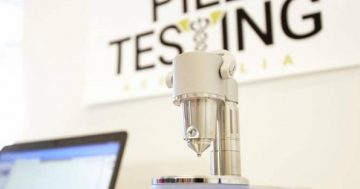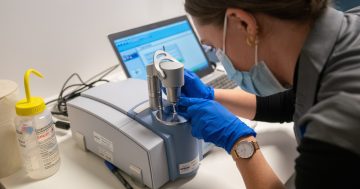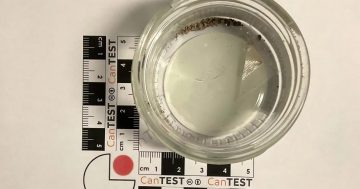
In an Australian first, the ACT Government will allow free pill testing to take place at the Spilt Milk music festival in Canberra on November 25 as part of a harm-minimisation approach to illicit drug use.
The move follows months of negotiations between the Safety Testing Advisory Service at Festivals and Events (STA-Safe) consortium and the ACT Government.
ACT Minister for Health and Wellbeing Meegan Fitzharris said the Government did not condone drug use but the service would be a way of keeping young people safe.
“The ACT Government has carefully assessed the proposal from STA-Safe and will allow pill testing at Spilt Milk,” Ms Fitzharris said.
“Pill testing means young people who are considering taking drugs can be informed about what’s really in their pills and how potent they are, and it creates an opportunity to remind them of the risks before they make the final decision to take a drug.”
“There is no evidence that having pill testing available results in increased illicit drug taking.”
Pill testing at the music festival, an anonymous and free service, will be provided by Harm Reduction Australia.
President of Harm Reduction Australia Gino Vumbaca welcomed the ACT Government’s decision, telling the ABC: “We’re talking about safe drug use. We want people to be as safe as they can be when they’re using drugs, and that means knowing what they’re actually using.
“One thing that we’ve made very clear is that we won’t be telling people that it’s safe to use a particular drug. There are harms associated with any drug use. What we’re trying to do is make it safer.”
A Government statement said the testing process will look into the following aspects:
- A separate stand-alone service will be established, located in close proximity to the event’s medical area;
- The staff undertaking pill testing will be appropriately trained in using pill testing equipment;
- Staff delivering advice and intervention about drug use will be trained in drug counselling;
- The equipment used for pill testing must be able to reliably, within an acceptable timeframe, identify the major drug present in an unknown tablet or powder as well as potentially detect adulterants and/or substances that are unknown;
- Regular communication should flow between the event organiser as well as ambulance and medical personnel in the nearby medical area to share information on the results of pill testing; this regular communication may assist with informing medical procedures in the case of overdose or any other adverse event;
- Pill testing has limitations and these must be communicated to patrons of the pill testing service. This includes communicating that pill testing does not guarantee identification of each substance contained within a substance;
- Each patron must be directly notified, regardless of the pill testing result, that drug taking is inherently unsafe. Each patron must be notified that safe disposal of drugs is the best way to avoid health risk;
- Bins must be provided by the service for safe disposal of drugs. The drugs contained in amnesty bins must be destroyed on site, such that they cannot be reconstituted and safely disposed of at the conclusion of the event by the harm reduction service.
- The harm reduction service will collect evaluative data, which would include but not be limited to:
- The number of patrons attending the service,
- The number of brief interventions, as well as pill tests, delivered,
- The number of patrons who discarded their drug at the service,
- The chemical content detected in each sample tested.
- This data must be shared with key stakeholders so that it may inform possible pill testing in the future, both for safety and operational aspects. This might include, for example, communicating to police and public health of the circulation of illicit drugs, notably contaminated drugs, substances of high purity or novel psychoactive substances.
The ACT Greens have welcomed the announcement.
“Our priority is, and has always been, ensuring the health and safety of our young people,” ACT Greens MLA and drug law reform spokesperson Shane Rattenbury said.
“Today’s announcement is an important step forward, acknowledging that drug law reform is a public health issue—and our first priority must always be to minimise harm and to keep Canberra safe.
“We’re pleased to see that the Government has finally listened to the advice of numerous public health experts and the Canberra community.”
Earlier this month, the ACT Greens tabled a petition of more than 1,000 signatures backing pill testing in the ACT. The proposal also formed part of the ACT Greens’ election commitments. The Greens have actively campaigned for pill testing at recent music festivals – at Groovin The Moo both in 2016 and 2017, and for Spilt Milk last year.
“The Greens will always advocate for policies supported by the evidence. Public health organisations and experts have long told us that there is overwhelming evidence to support pill testing as an effective harm minimisation measure,” Mr Rattenbury said.
“Pill testing will also provide data for public health or law enforcement purposes, as well as an opportunity to reach a population of users that would otherwise be unlikely to engage support services.
“At the moment health and law enforcement authorities in Canberra know little or nothing about the presence of harmful drugs available at any particular time in the ACT. We don’t have a coherent, real-time early warning system about what drugs are circulating in the community, but the data collected through pill testing could help fill this gap.”
Do you think pill testing at music festivals will be effective in decreasing drug-induced risks, or do you think it might encourage more drug usage?




















